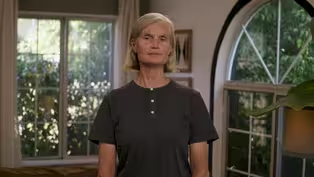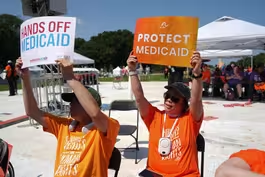
Economy grows more than expected despite trade war concerns
Clip: 7/30/2025 | 7m 32sVideo has Closed Captions
Economy grows more than expected despite trade war concerns
The Federal Reserve announced it would keep interest rates steady, despite dissents from two members of its rate-setting committee who were appointed by President Trump. Trump has been pressuring Jerome Powell to cut rates, but the Fed chair has expressed concerns about tariffs and inflation. Geoff Bennett discussed where things stand with Nick Timiraos of The Wall Street Journal.
Problems playing video? | Closed Captioning Feedback
Problems playing video? | Closed Captioning Feedback
Major corporate funding for the PBS News Hour is provided by BDO, BNSF, Consumer Cellular, American Cruise Lines, and Raymond James. Funding for the PBS NewsHour Weekend is provided by...

Economy grows more than expected despite trade war concerns
Clip: 7/30/2025 | 7m 32sVideo has Closed Captions
The Federal Reserve announced it would keep interest rates steady, despite dissents from two members of its rate-setting committee who were appointed by President Trump. Trump has been pressuring Jerome Powell to cut rates, but the Fed chair has expressed concerns about tariffs and inflation. Geoff Bennett discussed where things stand with Nick Timiraos of The Wall Street Journal.
Problems playing video? | Closed Captioning Feedback
How to Watch PBS News Hour
PBS News Hour is available to stream on pbs.org and the free PBS App, available on iPhone, Apple TV, Android TV, Android smartphones, Amazon Fire TV, Amazon Fire Tablet, Roku, Samsung Smart TV, and Vizio.
Providing Support for PBS.org
Learn Moreabout PBS online sponsorshipGEOFF BENNETT: The U.S. economy rebounded in the second quarter of the year, but new data also show signs of some weakness under the headline numbers.
The country's GDP -- that's the value of goods and services produced in the economy -- grew at an annual rate of 3 percent in the second quarter.
But the overall rate of growth is just 1.2 percent for the year and spending by both consumers and businesses has slowed.
For its part, the Federal Reserve announced it would keep interest rates steady.
That's despite dissents from two members of its rate-setting committee, both of whom were appointed by President Trump.
President Trump has been pressuring Fed Chair Jerome Powell to cut rates, but Powell explained the hesitation today.
JEROME POWELL, Federal Reserve Chairman: If we cut rates too soon, maybe we didn't finish the job with inflation.
There's -- history is dotted with examples of that.
If you cut too late, then maybe you're doing unnecessary damage to the labor market.
So we're trying to - - we're trying to get that timing right.
GEOFF BENNETT: That timing may be connected to the prospect of more tariffs and whether they could spark higher inflation.
President Trump is threatening to impose new tariffs on dozens of countries starting Friday.
In fact, he said today that India would face tariffs as high as 25 percent.
To help break down where things stand, we're joined now by Nick Timiraos, chief economics correspondent for The Wall Street Journal.
Nick, it's always good to see you.
So let's start with the GDP because there's lots to digest in the report.
What are the takeaways?
What does it say about the state of the economy?
NICK TIMIRAOS, The Wall Street Journal: Well, it tells you that the economy is doing OK.
In the first quarter, recall, we had a negative GDP print, but it was sort of anomalous because it reflected a bunch of inventory front-running, importing ahead of the tariffs.
And so that actually pulled down the headlight number.
It all went the other way in the second quarter.
But as you noted in setting this up, if you look at private spending and investment, it was softer in the second quarter than it was in the first quarter.
And it was softer in the first quarter than it was at the end of last year.
In fact, that reading was the weakest since 2022.
So the issue here really is that the economy is slowing, but it doesn't look alarming right now.
GEOFF BENNETT: The White House said today that these numbers prove that the economy is solid, that mainstream economists were wrong about the tariffs, that inflation is under control.
What's your reaction to that based on your reporting and your deep knowledge of all this stuff?
NICK TIMIRAOS: Well, again, what you see is growth that's somewhere between 1 and 2 percent if you average the two quarters.
And so there's a little bit of an inconsistency from the White House, because the argument is the economy is booming and also we need lower interest rates.
And if we get into the Fed discussion, the Fed doesn't cut interest rates if the economy is booming, because they're going to be concerned that you could have an overheated economy and that you could have higher inflation.
So there's a little bit of a disconnect here between, well, if the economy is so outstanding, why does it so desperately need a lower cost of overnight money?
GEOFF BENNETT: You mentioned the Fed.
Today, it kept rates steady for the fifth street meeting, as markets well expected.
Tell us more about the chairman's rationale.
NICK TIMIRAOS: Well, if you step back to where we were a year ago, inflation was coming down.
It was coming down without a serious downturn that a lot of economists had said would be the price of getting inflation down two or three years ago.
So that was sort of the soft landing everybody was talking about a year ago.
Now, tariffs come along at the beginning of the year and they create sort of a crosswind because there's a risk, not at all a certainty, that higher tariffs will feed through to higher goods prices.
And so after several years of inflation, where businesses, frankly, have learned how to raise prices in ways that they didn't before the pandemic because they were worried about losing market share, the worry is, well, maybe businesses will do this again.
Maybe they will pass those cost increases along to consumers.
Now, Jay Powell, the Fed chair, did say today that consumers are fatigued with inflation.
So there's a chance they won't accept higher prices and businesses will in fact lose market share.
But the point here is that tariffs have created hand-to-hand combat between importers, suppliers, retailers, and potentially consumers because somebody is going to have to pay.
And the Fed wants to make sure that that if those prices get passed along to consumers, we don't have another episode of higher inflation.
GEOFF BENNETT: Hand-to-hand combat is a great way to explain it.
What about the potential for cuts in September?
How are things looking?
NICK TIMIRAOS: Well, I would say that Chair Powell today gave the old Heisman stiff-arm.
I was at the press conference.
And a number of my colleagues, we all tried to lay whatever traps we could to try to goad him and to giving any kind of clue about what it would take to cut interest rates at the Fed's next meeting, which, as you noted, is in September, and he just did not go for it.
So they will have two more months of jobs reports, two more months of inflation data.
I think what you would need to see to get a rate cut in September would be some weakness, some meaningful weakness potentially in the labor market.
And so if you're cheering for rate cuts here, it's a little bit of a story to be careful what you wish for, because the sorts of things that may get the Fed to move would be weaker labor market data.
Now, I should note, the Fed could also cut interest rates if the labor market is fine, and inflation comes in mild.
Everybody's been bracing for a little bit higher inflation, and if it turns out that those tariffs are not getting passed along to the consumer, then the Fed might judge, OK, maybe we have seen enough.
They have been on hold for six months now.
And so after two more months, they may decide, look, we're not seeing the price pressures.
It's being absorbed in the supply chain somewhere else, and they don't want to have a recession if the labor market slows in a sort of unexpected fashion.
GEOFF BENNETT: In the 30 seconds or so we have left, Nick, I want to ask you about the two Trump-appointed members of the Fed voting board who dissented, who want the Fed to cut rates.
You wrote a piece this week that the Fed is in many ways sort of split into three camps.
Tell us what they are and whether these two who dissented have more sway.
NICK TIMIRAOS: Well, sometimes, dissents tell you about where the Fed is going.
I would not say that that's the case today.
So one of the governors, Chris Waller, laid out very clearly two weeks ago why he was going to dissent.
And his worry is that the labor market is going to weaken more if the Fed keeps rates where they are.
Now, there's a second camp that this -- also that shares some of those concerns.
They just weren't ready to cut interest rates today.
And then there's a third camp that says, wait a minute, the economy looks fine.
We have got something creating price pressures.
And so we just need to wait here.
We don't want to cut interest rates right now.
GEOFF BENNETT: Nick Timiraos, chief economics correspondent for The Wall Street Journal, thanks, as always, for being with us.
We appreciate it.
NICK TIMIRAOS: Thanks for having me.
Colorado AG on why the state is suing a deputy who aided ICE
Video has Closed Captions
Clip: 7/30/2025 | 8m 26s | Colorado AG explains why the state is suing a deputy who aided ICE (8m 26s)
Dog Lady's Brief But Spectacular take on rethinking rescue
Video has Closed Captions
Clip: 7/30/2025 | 3m 29s | The Dog Lady's Brief But Spectacular take on Rethinking Rescue (3m 29s)
Hawaii avoids major damage after quake triggers tsunami
Video has Closed Captions
Clip: 7/30/2025 | 4m 14s | Hawaii avoids major damage after massive earthquake triggers tsunami (4m 14s)
Louisiana braces for impact of Medicaid cuts
Video has Closed Captions
Clip: 7/30/2025 | 4m 7s | Medicaid recipients in Louisiana brace for impact of work requirements and cuts (4m 7s)
News Wrap: Israeli strikes, gunfire kill at least 46 in Gaza
Video has Closed Captions
Clip: 7/30/2025 | 9m 5s | News Wrap: Israeli strikes and gunfire kill at least 46 in Gaza (9m 5s)
Pronatalism movement encourages people to have more babies
Video has Closed Captions
Clip: 7/30/2025 | 9m 37s | A look inside the pronatalism movement encouraging Americans to have more children (9m 37s)
Simple lifestyle changes that could help prevent dementia
Video has Closed Captions
Clip: 7/30/2025 | 6m 34s | Study reveals simple lifestyle changes could help prevent dementia (6m 34s)
Providing Support for PBS.org
Learn Moreabout PBS online sponsorshipSupport for PBS provided by:
Major corporate funding for the PBS News Hour is provided by BDO, BNSF, Consumer Cellular, American Cruise Lines, and Raymond James. Funding for the PBS NewsHour Weekend is provided by...


















